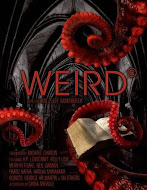With Christmas
behind me [thank god], I can unlock my bunker’s hatch and see the sun [or an
approximation of the sun; the weather is far from grand, but you get my point]
without any of the unnecessary, forced cheer. While I do like the idea of
Christmas and what it theoretically represents as a holiday, Christmas
festivities have morphed into a vehicle for maintaining the appearance of
satisfied, joyous family union to the point you really have to go down the
rabbit hole of self-delusion to squeeze out the promised Christmas spirit.
Unless of course, you are a member of a family, which has not been warped by
this reality into a squinting cynic, and you really do have a jolly good time
at every Christmas. Congratulations, you’re a better person than me or a
character in a Christmas movie [yeah, I’m snarky when it comes to Christmas].
Anyway, I’m done
talking about Christmas. I’m already looking towards the passing of 2011. It’s
passing excites me and I’m scheming what to do with the whole of 2012, when
that tiny New Year’s moment elapses, when December 31st shifts into
January 1st. Unlike most people, I don’t view New Year’s Eve as an
excuse to consume alcohol with reckless wanton, though I see it too often among
my peers, which I’m sure is common, since New Year’s Ever has been the biggest
party in the calendar since I’m old enough to remember, but to me New Year’s
the time to shed a skin you don’t need, leave yourself pink, fresh, with nerve
endings naked and virginal, but heeding the lessons of past years. It’s a
restart button on a simply calendar level and I love it.
After I’ve read “Booklife”
by Jeff VanderMeer, I think that I’ve been on the right track to get some
general ideas on how I want the year to pass, but I’ve been missing the
strategic element to bind my goals from year to year in a Master Plan, which
will ensure that I reach my overall goals for a minimal amount of time. I’ve
come to understand that knowing what you want is a lot different from knowing
how to get what you want. So without further ado, I have drafted a five year
plan and the achievements I want to have to my name. With that in mind, I’ve
found a course of action to support these plans. It sounds all very general,
but this is my warm-up post to a week of publicly stating what I will cut down
on and what I will emphasize on come next year, because I believe that stating
these goals to a broad audience creates a pact. If I’m to keep these goals to
myself, I’m much more likelier to cheat [yeah, I’m a douche like that], but
stating my intentions on the web will keep in line.
In general, I
envision my 2012 to have more reading, writing and exercise and less TV, 9gag
and unhealthy foods. It’s a scary perspective, hard to reinvent my personality
type, but I don’t see myself lasting longer, if I don’t lead a healthier lifestyle,
for the sake of my body and mind.
Do you guys make
plans?


































